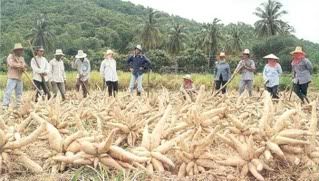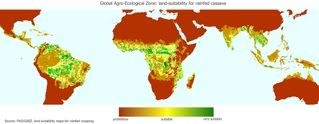First comprehensive energy balance study reveals cassava is a highly efficient biofuel feedstock
 While most of the world is scrambling after corn and sugar for answers to its renewable energy needs, many developing countries are focusing on a lesser known plant — cassava, also known as manioc. A new study for the first time calculates the net energy value ('NEV', 'energy balance') of cassava ethanol and finds that the tropical starchy tuber makes for a highly efficient source of renewable energy.
While most of the world is scrambling after corn and sugar for answers to its renewable energy needs, many developing countries are focusing on a lesser known plant — cassava, also known as manioc. A new study for the first time calculates the net energy value ('NEV', 'energy balance') of cassava ethanol and finds that the tropical starchy tuber makes for a highly efficient source of renewable energy.Cassava, a crop grown across the Global South, is a hardy plant that thrives in relatively poor soils and requires limited water and fertiliser inputs. It grows explicitly on land not associated with rainforests (see map, click to enlarge), and several hundred million hectares of unused non-forest land suitable for cassava are available in the tropics and the sub-tropics. Some of the world's leading biotech scientists, including two Nobel Laureates, Norman Borlaug (father of the Green Revolution) and S. Mohan Jain, are working on improving cassava as an energy crop.
Global land suitability for rainfed cassava (click to enlarge)
Studying the energy balance of biofuels is important because if they do not yield much net energy, the question is whether the resources they use up (land, water) can be used in a better way. There is some controversy surrounding the energy balance of ethanol made from corn, with some scientists finding that the fuel has a negative balance; in other words, more energy is invested in the production chain than is contained in the finished fuel product. Other researchers have found a slightly positive balance of around 1.5 - for each unit of energy invested in the production of corn ethanol, 1.5 units of energy are contained in the fuel once you pour it into the tank of a vehicle (earlier post). For sugarcane based ethanol, the energy balance is between 8 and 10 (earlier post).Tropical crops have a significant advantage over biofuel crops grown in temperate climates: they convert sunlight more efficiently into biomass and yield far more of it. The result: the energy balance of biofuels made from such crops is considerably stronger. Or in other words, to produce one unit of energy in the form of a liquid fuel, tropical crops require far less land and resources than crops grown in temperate regions.
Thu Lan Thi Nguyen, Shabbir H. Gheewala, and Savitri Garivait from the Thonburi University of Technology have now determined that the same logic holds for cassava (Manihot esculenta), grown in a tropical country like Thailand. They published their findings in the journal Environmental Science & Technology. The results provide a "framework" for policy makers to evaluate whether ethanol from cassava is feasible and practical, says lead author Shabbir Gheewala.
Net renewable energy balance
Thailand already has a cassava-derived ethanol pilot plant, and the government is aiming to build 12 full-scale facilities by 2008, based on expanded cassava plantings that are set to benefit small farmers (earlier post). Using scaled-up data from this existing pilot plant, the authors calculate the NEV of cassava-based ethanol as 10.22 megajoules per liter (MJ/L), an overall positive yield. The most optimistic assessment for corn shows an NEV of around 4.51 MJ/L, meaning cassava is more than two times as efficient. NEV is a measure of the energy content of ethanol minus the net energy used in the production process. The usefulness of NEV in evaluating an ethanol source is debatable, but with well-defined boundaries and clearly stated assumptions, it can provide a measure of the energy consumption and yield of the ethanol production from a one particular source.
NEV may not be the best instrument to evaluate biofuels' contribution to energy security, the authors point out in the paper. 'Renewability' is equally important. This factor is determined by the amount of fossil fuels used in the ethanol-manufacturing process. Consequently, they used yet another tool, the "net renewable energy value", defined as the energy content of ethanol minus the total fossil-energy inputs. When fossil-fuel inputs (97.35% of the energy inputs) were taken into consideration, the NREV of cassava fell to 9.15 MJ/L - still strongly positive.
According to the authors, several features make cassava more advantageous than sugar cane or cane molasses:
 bioenergy :: biofuels :: energy :: sustainability :: ethanol :: cassava :: manioc :: energy balance :: Thailand ::
bioenergy :: biofuels :: energy :: sustainability :: ethanol :: cassava :: manioc :: energy balance :: Thailand :: The tuber is already used as a starch source and for chip/pellet products. It can be grown in any season and can be a year-round source of ethanol. "In Thailand, cassava is the third most important cash crop after rice and sugar cane," says Gheewala. Sugarcane is a seasonal crop, and since ethanol cannot be stored during long periods of time, bridging the period between cane harvesting and the off-season is problematic.
"Over the past 20 to 30 years, cassava agronomy research has contributed significantly to the development of improved agricultural practices, such as time and method of planting, intercropping, soil erosion control, and especially, weed control and fertilizing." The result: Thailand uses less fertilizers and herbicides than China to grow cassava, yet it provides a comparable yield.
Importance for policy makers
The study "addresses a question that's of policy interest right now," says agricultural economist Satish Joshi of Michigan State University. Uwe Fritsch at the Institute for Applied Ecology (Germany) agrees. "Cassava is a feedstock that is not in the major debate so far," and yet it is a crop of "relevance for a lot of developing countries," he says. The findings also explain the "life-cycle implications of this kind of biofuel," he adds.
However, the authors' calculations will remain meaningless without an understanding of their economic relevance, says Fritsch. "We have a lot of solar energy, for example, but it's very expensive so it does not mean much." The authors agree. "A general idea about the market dynamics is useful to understand the overall situation," they report in the paper.
Fritsch also points out the absence of any reference to greenhouse-gas emissions. "Net energy balance is for scientists," he says. The real economic implications of any biofuel source remain unknown without an estimate of its greenhouse-gas emissions, because that is where "most of the current debate" lies, Fritch adds. For many biofuels made from different crops, such GHG-emissions balances have been carried out. For corn ethanol, for example, some researchers have found that it does not reduce GHG-emissions very much (earlier post); sugarcane ethanol does so far better (earlier post). For other tropical crops, this aspect still needs to be investigated.
Cassava biotech research
Some of the world's leading scientists are working on improving cassava. Amongst them Norman Borlaugh, father of the Green Revolution, who is sequencing the crop's genome in order to breed varieties for energy. His work is part of the bioenergy research at the U.S. Department of Energy's Joint Genome Institute (earlier post).
Earlier, we also pointed to research being undertaken by researchers from the International Atomic Energy Agency, who are using the latest plant breeding techniques to make cassava an even more interesting energy crop. The tools: nuclear techniques to induce mutagenesis and obtain mutant varieties, and space-breeding, which is based on a similar process but then relying on radiation from space that affects and transforms seeds into interesting varieties.
More information:
Thu Lan Thi Nguyen, Shabbir H. Gheewala, and Savitri Garivait, "Full Chain Energy Analysis of Fuel Ethanol from Cassava in Thailand" [*abstract], Environ. Sci. Technol.; 2007; ASAP Web Release Date: 11-Apr-2007; and article: DOI: 10.1021/es0620641
 --------------
--------------
 As part of its 'Le dessous des cartes' magazine, Europe's culture TV channel ARTE airs a documentary about the geopolitics of sustainable transport tonight, at 10.20 pm CET. Readers outside of Europe can catch it
As part of its 'Le dessous des cartes' magazine, Europe's culture TV channel ARTE airs a documentary about the geopolitics of sustainable transport tonight, at 10.20 pm CET. Readers outside of Europe can catch it 








0 Comments:
Post a Comment
Links to this post:
Create a Link
<< Home